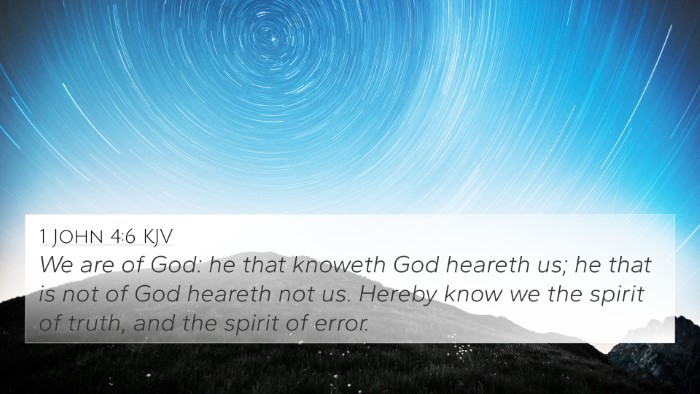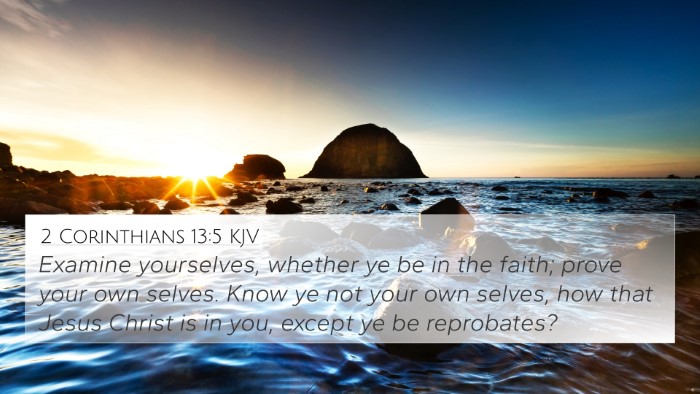Understanding John 14:17
John 14:17 (KJV) reads: “Even the Spirit of truth; whom the world cannot receive, because it seeth him not, neither knoweth him: but ye know him; for he dwelleth with you, and shall be in you.”
This passage holds significant importance within the context of Jesus' teachings concerning the Holy Spirit. To appreciate its depths, let us explore insights from reputable public domain commentaries, such as those by Matthew Henry, Albert Barnes, and Adam Clarke.
Verse Meaning and Interpretation
Matthew Henry Commentary: Henry emphasizes that the Holy Spirit is described as “the Spirit of truth” — a guide who teaches truth and reveals God. He notes that the world, in its ignorance and sinfulness, cannot recognize or accept this truth. For the believer, however, there exists a profound intimacy, as the Holy Spirit dwells within them, guiding their understanding and helping them remain steadfast in their faith.
Albert Barnes Notes: Barnes highlights the contrast between the believer and the world, underscoring that the world cannot perceive the Spirit because it is rooted in materialism and spiritual blindness. The faithful, through faith, can experience the indwelling of the Spirit, providing them with divine wisdom, strength, and comfort. This indwelling represents the fulfillment of Jesus' promise to send a Helper, assuring believers of God’s active presence in their lives.
Adam Clarke's Commentary: Clarke interprets this verse as indicative of the profound union between the believer and the Holy Spirit. He elaborates on the term “dwelleth” as meaning that the Spirit would live with and within believers, establishing a divine presence that empowers them to live righteously. He further suggests that this relationship highlights the transformative power of the Spirit, enabling Christians to walk in accordance with God’s will.
Cross-References and Thematic Connections
John 14:17 connects with several other verses in the Scriptures, providing a more comprehensive understanding of the Holy Spirit's role:
- Acts 2:38-39: Emphasizes the gift of the Holy Spirit to all who believe.
- Romans 8:9: States that believers possess the Spirit of God, distinguishing them from those who are in the flesh.
- 1 Corinthians 2:12: Illustrates how believers have received the Spirit to understand the things freely given by God.
- Galatians 4:6: Describes how God sends the Spirit into the hearts of believers, affirming their relationship as children of God.
- Ephesians 1:13-14: Discusses how believers are sealed with the Holy Spirit as a guarantee of their inheritance.
- 1 John 4:13: Offers assurance of the Spirit's indwelling as evidence of our connection with God.
- John 16:13: Indicates the Holy Spirit's role in guiding believers into all truth.
Thematic Bible Verse Connections
The theme of the Holy Spirit's presence in the life of believers is prevalent throughout both the Old and New Testaments, displaying a continuity of God's purpose:
- Old Testament Reference: Joel 2:28-29 - God's promise to pour out His Spirit on all people, which foreshadows the events of Pentecost.
- New Testament Reference: John 20:22 - Jesus breathing on His disciples and imparting the Holy Spirit, illustrating His abiding presence.
How to Use This Verse in Context
When studying John 14:17, it’s helpful to consider how it fits into the broader narrative of Jesus' farewell discourse, where He reassures His disciples of the Holy Spirit's coming. This can enhance understanding of:
- Comfort in Grief: Reflect on the comfort that the Holy Spirit provides, as emphasized in John 14:16 and 14:26.
- Truth and Guidance: Explore how the Holy Spirit leads believers into truth, reinforcing the importance of living in accordance with Scripture.
- Personal Relationship with God: Meditate on the intimacy expressed in the promise that the Spirit dwells within believers, fostering a personal connection with God.
Tools and Resources for Cross-Referencing
For deeper studies and cross-referencing, consider utilizing these tools:
- Bible Concordance: A resource for finding words or phrases along with their references.
- Bible Cross-Reference Guide: Helps find interconnected verses across different books.
- Cross-Reference Bible Study Methods: Techniques for analyzing scripture connections systematically.
- Bible Reference Resources: Comprehensive materials that provide context and insights.
Conclusion
John 14:17 encapsulates a pivotal doctrine of Christianity: the presence of the Holy Spirit in the life of every believer. Through comparative analyses of related Bible verses and thoughtful study methods, one can uncover the profound implications of this truth. Engaging with cross-references not only enriches understanding but also affirms the unchanging nature of God's promises to His people.


























